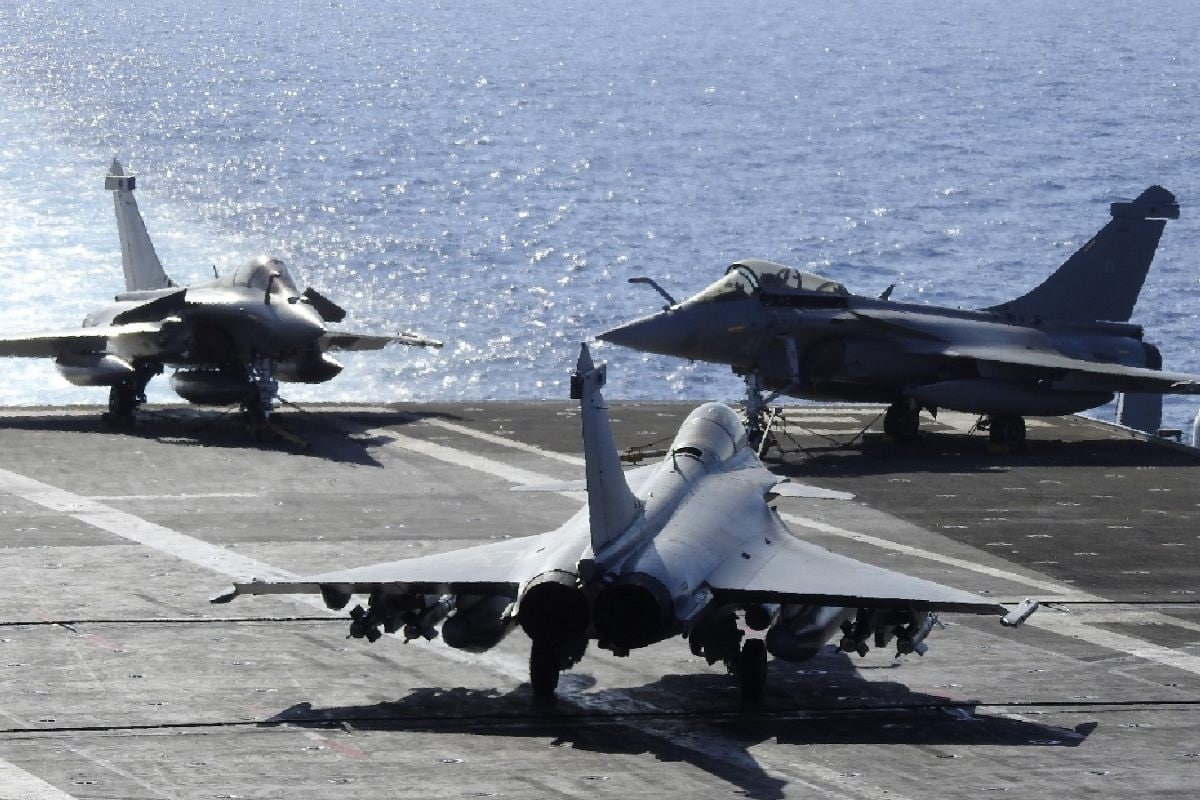India Poised to Acquire Rafale-M Fighter Jets from France
National NationalPosted by AI on 2025-04-19 23:36:01 | Last Updated by AI on 2025-08-02 05:17:01
Share: Facebook | Twitter | Whatsapp | Linkedin Visits: 4

How will India's naval air power be transformed? On April 28th, India and France are expected to finalize a landmark deal for the procurement of Rafale-M fighter jets, significantly bolstering India's maritime defence capabilities. This agreement marks a crucial step in modernizing the Indian Navy's fleet and solidifying the strategic partnership between the two nations.
The Rafale-M, the naval variant of the Rafale fighter jet, is renowned for its advanced capabilities. Designed for operations from aircraft carriers, it boasts cutting-edge avionics, a robust weapons payload, and exceptional range and maneuverability. These attributes make it a formidable asset in contested maritime environments, capable of undertaking a wide array of missions, from air-to-air combat and maritime strikes to reconnaissance and electronic warfare. The acquisition of these aircraft addresses a critical need for the Indian Navy, which has been seeking to enhance its carrier-based fighter fleet.
The impending deal comes after extensive evaluations and negotiations between the two countries. The Indian Navy has carefully considered the Rafale-M's performance, compatibility with existing infrastructure, and long-term maintenance requirements. The decision underscores India's commitment to maintaining a credible deterrent in the strategically important Indian Ocean region. The Rafale-M's advanced capabilities are expected to complement the existing fleet of MiG-29K fighters and enhance the Indian Navy's ability to project power and safeguard its maritime interests.
The Rafale-M's integration into the Indian Navy will have far-reaching implications. The jets are slated to operate from the INS Vikramaditya, India's current aircraft carrier, and the future indigenous aircraft carrier, INS Vikrant. This will provide a significant boost to the Navy's operational reach and flexibility, enabling it to respond effectively to evolving security challenges. The deal also strengthens the existing defence cooperation between India and France, which have a long history of collaboration in the aerospace and defence sectors.
Beyond the immediate military benefits, the acquisition has broader strategic significance. It reinforces India's commitment to indigenous defence production. While the initial batch of Rafale-M jets will be manufactured in France, subsequent aircraft could potentially be assembled in India under the "Make in India" initiative. This will not only contribute to boosting the domestic defence industry but also generate employment opportunities and technological advancements within the country.
This procurement represents a substantial investment in India's future naval capabilities. As the geopolitical landscape continues to evolve, maintaining a strong and modern navy is essential for safeguarding India's maritime interests, promoting regional stability, and projecting power in the Indian Ocean and beyond. The Rafale-M acquisition is a key component of this strategy, marking a decisive step towards a more capable and potent Indian Navy. The deal is expected to be finalized on April 28th, paving the way for the integration of these advanced fighter jets into India’s maritime defence arsenal. The coming months will see further details emerge about the specifics of the agreement, including the number of aircraft to be procured, delivery timelines, and the extent of technology transfer and indigenous production.
Search
Categories
- Sports
- Business
- History
- Politics
- International
- Science & Technology
- Social Issues
- Disaster Management
- Current Affairs
- Education
- Startup Business
- Startup News
- Awards
- Community Services
- Fundraising Events
- Volunteer Services
- Health Initiatives
- Innovations and Initiatives
- In News
- dummybanners
- Awards
- Partners
- Products
- Press Releases
- News
- Fast Check
- South
- సినిమా
- Gallery
- Sunday Chronicle
- Hyderabad Chronicle
- లైఫ్ స్టైల్
- National
- క్రైం
- ట్రెండింగ్
- జాబ్స్
- అంతర్జాతీయo
- బిజినెస్
- రాజకీయం
- బిజినెస్
- సంపాదకీయం
- నవ్య
- చిత్ర జ్యోతి
- క్రీడలు
- జాతీయం
- తెలంగాణ
- తాజా వార్తలు
- మన పార్టీ
- మన నాయకత్వం
- మన విజయాలు
- డౌన్లోడ్స్
- మీడియా వనరులు
- కార్యకర్తలు
- North East Skill Center News
- Government Schemes
- Entrepreneurship Support
- Employment Opportunities
- Skill Training Programs
- Departments
- Investments
- Initiatives
- Resources
- Telangana IT Parks
- Events & Jobs
- Press Releases
- News
- Airport News
- Newtons Laws of Motion
- Karbonn in Business
- Investments in Karbonn
- Company quarterly sales
- Markets
- Auto News
- Industry
- Money
- Advertisements
- Stock target
- Company Updates
- Stock Market
- Company Sales
- Staffing and HR
- Constituency Assembly
- General News
- Srikalahasti Temple
- Bojjala Sudhir Reddy
- Technology & Innovation
- Sports
- Business
- Products
- Industries
- Services & Trainings
- Tools & Resources
- Technology Integration
- Drug Seizures & Arrests
- Telangana Narcotics
- Law & Enforcement
- Rehabilitation
- Nationwide Drug Policing
- Nigeria Seizures
- Global Operations
- Drug Awareness
- Drug Enforcement Tech
- NCB Drug Seizures
- Judicial Crackdown
- India's Surveillance Tools
- Cross-Border Links
- Women Safety
- Cyber Crimes
- Drug Abuse
- Traffic & Road Safety
- Community Connect
- Public Safety Alerts
- Citizen Assistance
- Nellore City News
- Politics & Administration
- Events & Festivals
- Agriculture & Rural
- Business & Economy
- Health & Wellness
Recent News
- Oppo's Innovative Cooling Technology Coming to India with K13 Turbo Series
- Pakistan, Afghanistan & UAE To Play T20I Tri-Series In Sharjah Prior To Asia Cup
- India Vs England 5th Test Day 2 Weather Forecast: Will Rain Delay The Match?
- Surprise Choice! Shardul Thakur Appointed New West Zone Captain
- Boxing Federation Of India Elections Set For August 21
- 'Force Majeure Pause': Odisha FC Suspend Players, Staff Contracts Amid ISL 2025/26 Limbo
- Manchester United Make Enquiry For Manchester City Goalkeeper Stefan Ortega
- Prajwal Revanna's Leaked Videos: Rape Case and 2,000 Obscene Clips